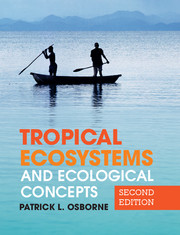Book contents
- Frontmatter
- Contents
- Preface
- Abbreviations and units
- Chapter 1 The tropical environment and climate
- Chapter 2 Dry, hot deserts and environmental factors
- Chapter 3 Grasslands and primary production
- Chapter 4 Savanna and population dynamics
- Chapter 5 Lakes, energy flow and biogeochemical cycling
- Chapter 6 Rivers, floodplains and estuaries
- Chapter 7 Wetlands and succession
- Chapter 8 Tropical rain forests and biodiversity
- Chapter 9 Mountains, zonation and community gradients
- Chapter 10 Mangroves, seagrasses and decomposition
- Chapter 11 Coral reefs and community ecology
- Chapter 12 Islands, archipelagos, biogeography and evolutionary ecology
- Chapter 13 Cities and human ecology
- Glossary
- References
- Index
Chapter 13 - Cities and human ecology
Published online by Cambridge University Press: 05 June 2012
- Frontmatter
- Contents
- Preface
- Abbreviations and units
- Chapter 1 The tropical environment and climate
- Chapter 2 Dry, hot deserts and environmental factors
- Chapter 3 Grasslands and primary production
- Chapter 4 Savanna and population dynamics
- Chapter 5 Lakes, energy flow and biogeochemical cycling
- Chapter 6 Rivers, floodplains and estuaries
- Chapter 7 Wetlands and succession
- Chapter 8 Tropical rain forests and biodiversity
- Chapter 9 Mountains, zonation and community gradients
- Chapter 10 Mangroves, seagrasses and decomposition
- Chapter 11 Coral reefs and community ecology
- Chapter 12 Islands, archipelagos, biogeography and evolutionary ecology
- Chapter 13 Cities and human ecology
- Glossary
- References
- Index
Summary
Human populations are becoming more concentrated through urbanisation and it has been estimated that, worldwide, each week, 1 million people move from rural areas into cities. In developed countries, 80% of the population now live in cities, and this contrasts with only 30% in developing countries, but this latter proportion is increasing rapidly. In 1950, no Asian city had more than 8 million people. By 1970, the populations of Beijing and Shanghai reached this size and, by 1990, were joined by Kolkata, Mumbai, Seoul, Tianjin, Jakarta, Delhi and Manila. Cities in other parts of the tropics have shown similar rapid growth.
These large cities require enormous imports of food, water and other materials in order to support their large human populations. Wastes generated within cities have to be removed. These material imports and waste exports exert an ecological stress on the surrounding ecosystems that produce the imports and receive the waste products. Appropriation of these ecosystem goods and services extends the environmental impact of a city far beyond its urban boundary. The extent of this influence is the city’s ecological footprint.
- Type
- Chapter
- Information
- Tropical Ecosystems and Ecological Concepts , pp. 427 - 451Publisher: Cambridge University PressPrint publication year: 2012



